The following are examples/ information and Picasso images I used for an Explore Art class, including a printable worksheet we used as a warm up, the project images are done by my little artist, Cyrus.
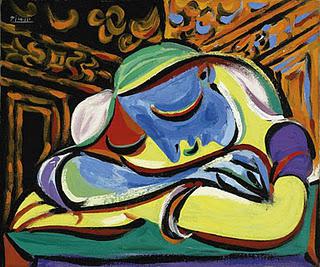 Pablo Picasso was a Spanish painter, he is known for 3 periods in his art work. His blue period where he used blue tones, paintings had a melancholy or sad look often portraying the poor, his rose period used warmer tones and depicted circus images/people and last his cubist period that looked at images and created them in a new way.
Pablo Picasso was a Spanish painter, he is known for 3 periods in his art work. His blue period where he used blue tones, paintings had a melancholy or sad look often portraying the poor, his rose period used warmer tones and depicted circus images/people and last his cubist period that looked at images and created them in a new way. 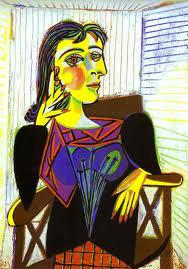 Picasso was one of the founders of cubism, which was a different, new way to look at art and create art. Cubism breaks down the subject matter and puts it back together again. Kind of like humpty, dumpty. It puts it back together using simplified shapes and forms. Picasso used bright, bold colors.
Picasso was one of the founders of cubism, which was a different, new way to look at art and create art. Cubism breaks down the subject matter and puts it back together again. Kind of like humpty, dumpty. It puts it back together using simplified shapes and forms. Picasso used bright, bold colors.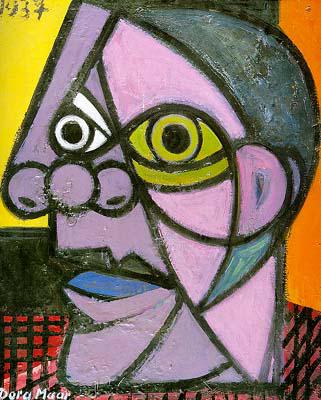 Picasso’s portraits (pictures of people’s faces) uses cubism by utilizing shapes, colors and different viewpoints- combining them to make a face.
Picasso’s portraits (pictures of people’s faces) uses cubism by utilizing shapes, colors and different viewpoints- combining them to make a face. - Do you know the difference of a profile view and frontal view of the face?
- What do you think of Picasso using both?
- What do you think of Picasso’s portraits?
- What is your favorite element (line, color, shape ect) in his work?
Portrait Project:
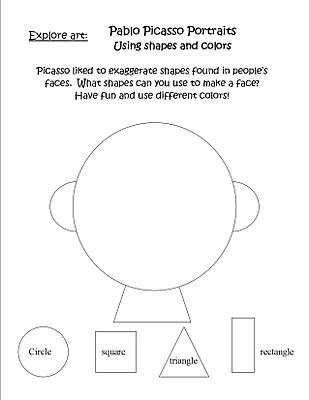 This was our warm up worksheet. Let your child name the shapes and then see how they can use them to make a face on the head.
This was our warm up worksheet. Let your child name the shapes and then see how they can use them to make a face on the head.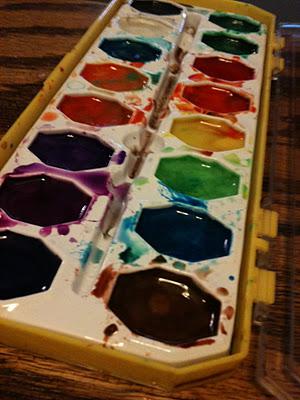 For the portrait project we did a crayon resistant watercolor painting. Similar to the Paul Klee project. You will need watercolor, or thicken paper, crayons, and watercolors/brush.
For the portrait project we did a crayon resistant watercolor painting. Similar to the Paul Klee project. You will need watercolor, or thicken paper, crayons, and watercolors/brush.Using crayons start with a large circle of the head on the watercolor paper. You can help your child and draw the circle make it nice a big so they can more room to work with. Talk with them as they fill in the facial features and ask them what kind of shapes they can/ are using and why? Encourage them to use bright, fun colors like Picasso. Have fun.
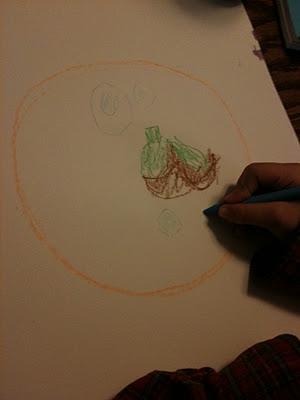 Cy was working on a portrait of his little brother Sage, but somewhere along the way he got a mustache. Pretty impressive for a 1 year old.
Cy was working on a portrait of his little brother Sage, but somewhere along the way he got a mustache. Pretty impressive for a 1 year old. 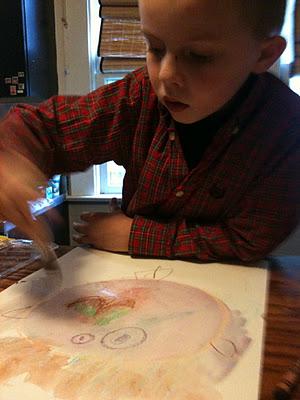 Once they are done with the outline of the portrait they can paint a watercolor wash over their drawing. The crayon image will remain while filling in the rest of the paper with the watercolors.
Once they are done with the outline of the portrait they can paint a watercolor wash over their drawing. The crayon image will remain while filling in the rest of the paper with the watercolors. 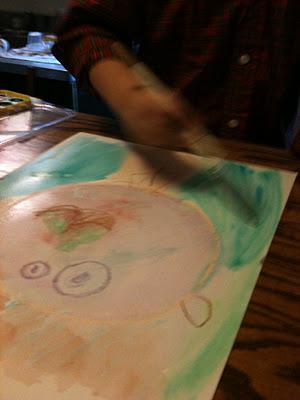 Don't forget to have them work on the background. If you look at Picasso's work he used colors and textures in his backgrounds. Annie from our art class drew spirals or swirls with crayons and then went over them painting stripes with her watercolors. A very unique, Picassoquese background. Cy picked several colors purple, blue and green for the image shown.
Don't forget to have them work on the background. If you look at Picasso's work he used colors and textures in his backgrounds. Annie from our art class drew spirals or swirls with crayons and then went over them painting stripes with her watercolors. A very unique, Picassoquese background. Cy picked several colors purple, blue and green for the image shown.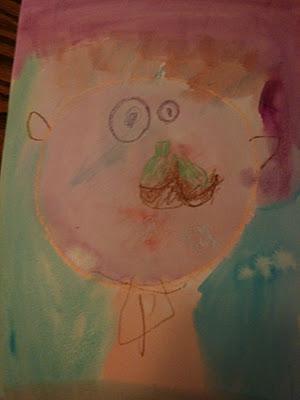 The final product, Cy titled "Sage with a Mustache"
The final product, Cy titled "Sage with a Mustache"There you go Picasso portrait project, great for a rainy day afternoon project. This probably took Cy 10 minutes. Easy set up, easy clean up, easy way to include art in their everyday.
 Subscribe in a reader
Subscribe in a reader

